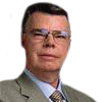
|
Bob Bishop
CEO
International Centre for Earth Simulation
Switzerland
Biography
Bob Bishop spent over 40 years in the technical, engineering, and scientific computing community and was responsible for building and operating the international aspects of Silicon Graphics Inc., Apollo Computer Inc., and Digital Equipment Corp. To accomplish this task, he lived with his family in five countries: the USA, Australia, Japan, Germany, and Switzerland. He was Chairman and CEO of SGI from 1999 to 2005.
Today, Bob remains involved in a range of global initiatives: he is a Fellow of the Australian Davos Connection, an elected member of the Swiss Academy of Engineering Sciences, and serves on the advisory boards for National ICT Australia (NICTA) and the EU’s Human Brain Project. Previously, he served on the advisory boards of the Multimedia Super Corridor in Malaysia, University Tenaga Nasional in Malaysia (Uniten), and UCLA's Laboratory for Neural Imaging (LONI).
Bob earned a BS (First Class Honors) in Mathematical Physics from the University of Adelaide, Australia, and an MS from the Courant Institute of Mathematical Sciences at New York University, and received his DS honoris causa from the University of Queensland.
In 2006, Bob was awarded the NASA Distinguished Public Service Medal for his role in delivering simulation facilities that helped NASA's space-shuttle fleet return-to-flight after the 2003 Columbia disaster.
Bob is founder and chairman of BBWORLD Consulting Services Sarl, and founder and president of the ICES Foundation, both Geneva-based organizations.
Abstract
Building a Virtual Earth to better understand the real world
We are living in an age of specialization, wherein universities, governments and industries have built their success by being highly focused and specialised in a singular domain. On the other hand, since Nature functions in such a smooth, integrated and holistic manner, what exactly are we missing by only using a specialized knowledge approach? This question leads precisely to the mission of the Geneva-based ICES Foundation: to develop a synthesis of the vast and diverse fields of present day scientific know- how into an integrated holistic knowledge system. Indeed, one may call integration a ‘missing science’ in its own right. The chosen tools to begin the ICES journey include advanced numerical modeling, simulation and visualization, plus selective use of very high performance computing, global Internet connectivity, and open access to publicly funded data sources. With these tools, we are able to build a ‘Virtual Earth’, and deal with the complex and unanswered ‘what if’ questions that society is asking of science today. And with the right visual narratives, civic engagement and policy guidance, societies can be given a more educated choice in their future direction than they are currently receiving.
|

